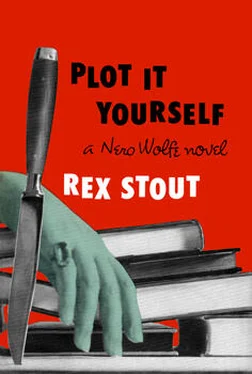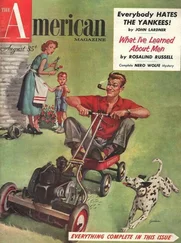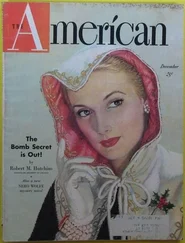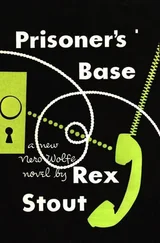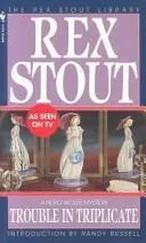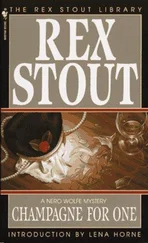I had used up half of Cora Ballard’s ideas. Of those left, two weren’t very promising. There are about a thousand banks with safe-deposit vaults in New York, and anyway I didn’t have keys to all the boxes, and besides, it was after hours. Taking a plane to the West Coast to look up Alice Porter’s parents seemed a little headlong. Finding an empty taxi in midtown Manhattan at that time of day was almost as hopeless, but I finally grabbed one and gave the driver the address on West 82nd Street.
Collander House could have been worse. The girl in the neat little office had a vase of daisies on her desk, and the room across the hall, which she called the lounge, where she sent me to wait for Mrs. Garvin, had two vases of daisies, comfortable chairs, and rugs on the floor. Another thirty-minute wait. When Mrs. Garvin finally appeared, one straight look from her sharp gray eyes confirmed Cora Ballard’s statement that anyone would trust her with anything. Certainly she remembered Alice Porter, who had lived there from August 1951 until May 1956. She had the dates in her head because she had looked them up at the request of a city detective last week, and had recalled them that morning because a woman had come and asked about Alice Porter. She hadn’t seen Alice Porter for three years and was keeping nothing for her. Not even some little thing like an envelope? No. Which didn’t mean a thing. She was a busy woman, and it was quicker to say no than to explain that it was none of my business and have me trying to persuade her that it was. A lie isn’t a lie if it is in reply to a question that the questioner has no right to ask.
All in all, a hell of an afternoon. Not one little crumb. And the immediate future was as bleak as the immediate past: another meatless dinner for Wolfe, after a beerless day. More gloom. He would be there at his desk, glaring into space, wallowing in it. As I climbed out of the taxi in front of the old brownstone I had a notion to go to Bert’s diner around the corner and eat hamburgers and slaw and discuss the world situation for an hour or so, but, deciding it wouldn’t be fair to deprive him of an audience, I mounted the stoop and used my key on the door; and, with one foot inside and one out, stopped and stared. Wolfe was emerging from the kitchen, carrying a large tray loaded with glasses. He turned in at the office. I brought my other foot in, shut the door, and proceeded.
I stood and looked it over. One of the yellow chairs was at the end of my desk. Six of them were in two rows facing Wolfe’s desk. Five more of them were grouped over by the big globe. The table at the far wall was covered with a yellow cloth, and on it was an assortment of bottles. Wolfe was there, transferring the glasses from the tray to the table.
I spoke. “Can I help?”
“No. It’s done.”
“A big party, apparently.”
“Yes. At nine o’clock.”
“Have the guests all been invited?”
“Yes.”
“Am I invited?”
“I was wondering where you were.”
“Working. I found no envelope. Is Fritz disabled?”
“No. He is grilling a steak.”
“The hell he is. Then the party’s a celebration?”
“No. I am anticipating events by a few hours. I have a job ahead of me that I prefer not to tackle on an empty stomach.”
“Do I get some of the steak?”
“Yes. There are two.”
“Then I’ll go up and comb my hair.”
I went.
Wolfe, at his desk, put down his coffee cup and sent his eyes to the ex-chairman of the Joint Committee on Plagiarism. “I like my way better, Mr. Harvey,” he said curtly. “You may ask questions when I finish if I haven’t already answered them.” His head went right, and left. “I could merely name the culprit and tell you that I have enough evidence to convict her, but while that would complete my job it wouldn’t satisfy your curiosity.”
Mortimer Oshin had the red leather chair ex officio. The committee members and the executive secretary had the six yellow chairs in front of Wolfe’s desk. In the front row were Amy Wynn, nearest me, then Philip Harvey, and then Cora Ballard. In the rear were Reuben Imhof, Thomas Dexter, and Gerald Knapp — the three publishers. Grouped over by the big globe were Dol Bonner, Sally Corbett, Saul Panzer, Fred Durkin, and Orrie Gather. In a spot by herself, at the end of my desk, was Alice Porter, who was sipping root beer from a glass that was prefectly steady in her hand. I had coffee. The others had their choices — gin and tonic, scotch and soda, scotch and water, rye and ginger ale, bourbon on the rocks, and one, Oshin, cognac. Evidently Oshin knew brandy. After he had taken a sip he had asked if he might see the bottle and had studied the label thoroughly, and after another sip he had asked, “For God’s sake, how much of this have you got?” I had taken the hint and given him a dividend, and he hadn’t lit a cigarette for at least five minutes.
Wolfe’s head went right and left again. “I should explain,” he told them, “the reason for Miss Porter’s outburst. It was justified. She is here because I lied to her. I told her on the phone that I was prepared to hand her a paper signed by Mr. Imhof and Miss Wynn in exchange for one signed by her. The word ‘prepared’ was a misrepresentation. When this discussion is ended I am confident that Miss Porter will be in no fear of prosecution by Mr. Imhof or Miss Wynn, but I was not actually ‘prepared’ when I phoned her this afternoon. In fairness to her I must say that her indignation, when she arrived and found a crowd, was warranted. She stayed because I told her I was going to demonstrate to you that she was guilty of a criminal act and I advised her to hear me.”
Alice Porter blurted, “You just admitted you’re a liar!”
Wolfe ignored it. “I’ll give you the essentials first,” he told the committee, “and the conclusions I reached, and then fill in the details. A week ago yesterday, eight days ago, Mr. Goodwin gave you a full report of the brief talks he had had with those four people — Simon Jacobs, Kenneth Rennert, Jane Ogilvy, and Alice Porter. I don’t know if any of you noticed that his talk with Miss Porter was quite remarkable — that is, her part of it. He told her that a New York newspaper was considering making her a substantial offer for the first serial rights to her story, and what did she say? That she would think it over. Beyond that, not a word. Not a question. All seven of you know writers better than I do, but I know a little of men and women. Miss Porter was not a famous and successful author; her only book had been a failure; her stories were barely sufficient, in quantity and quality, to preserve her standing as a professional. But she didn’t ask Mr. Goodwin the name of the newspaper. She asked him nothing. I thought that remarkable. Did none of you?”
“I did,” Cora Ballard said. “But she was on a spot. I thought she was just scared.”
“Of what? If she doubted Mr. Goodwin’s bona fides, if she suspected that he might not have such an offer from a newspaper, why didn’t she question him? At the very least, why didn’t she ask him the name of the newspaper? It seemed to me a fair surmise that she didn’t doubt or suspect Mr. Goodwin; she knew he was lying. She knew that this committee had hired me, and that he was trying by subterfuge to get a copy of the story on which she had based her claim against Miss Wynn. At the moment—”
“How could she know?” Harvey demanded. “Who told her?”
Wolfe nodded. “Of course that was the point. At the moment the surmise was only of minor interest, but the next day, when it was learned that Simon Jacobs had been murdered, it took on weight; and more weight when Jane Ogilvy too was killed; and still more when Kenneth Rennert made it three — and Alice Porter was still alive. Attention was focused on her, but I continued to doubt that she was the target because I could not believe that she had invented a style of composition for ‘There Is Only Love’ for her claim against Ellen Sturdevant, and imitated it for ‘What’s Mine Is Yours’ for the claim made by Simon Jacobs against Richard Echols, and again imitated it for ‘On Earth but Not in Heaven’ for the claim made by Jane Ogilvy against Marjorie Lippin, and then abandoned it and used her natural style for ‘Opportunity Knocks’ for the claim made by her against Amy Wynn. But last evening—”
Читать дальше
